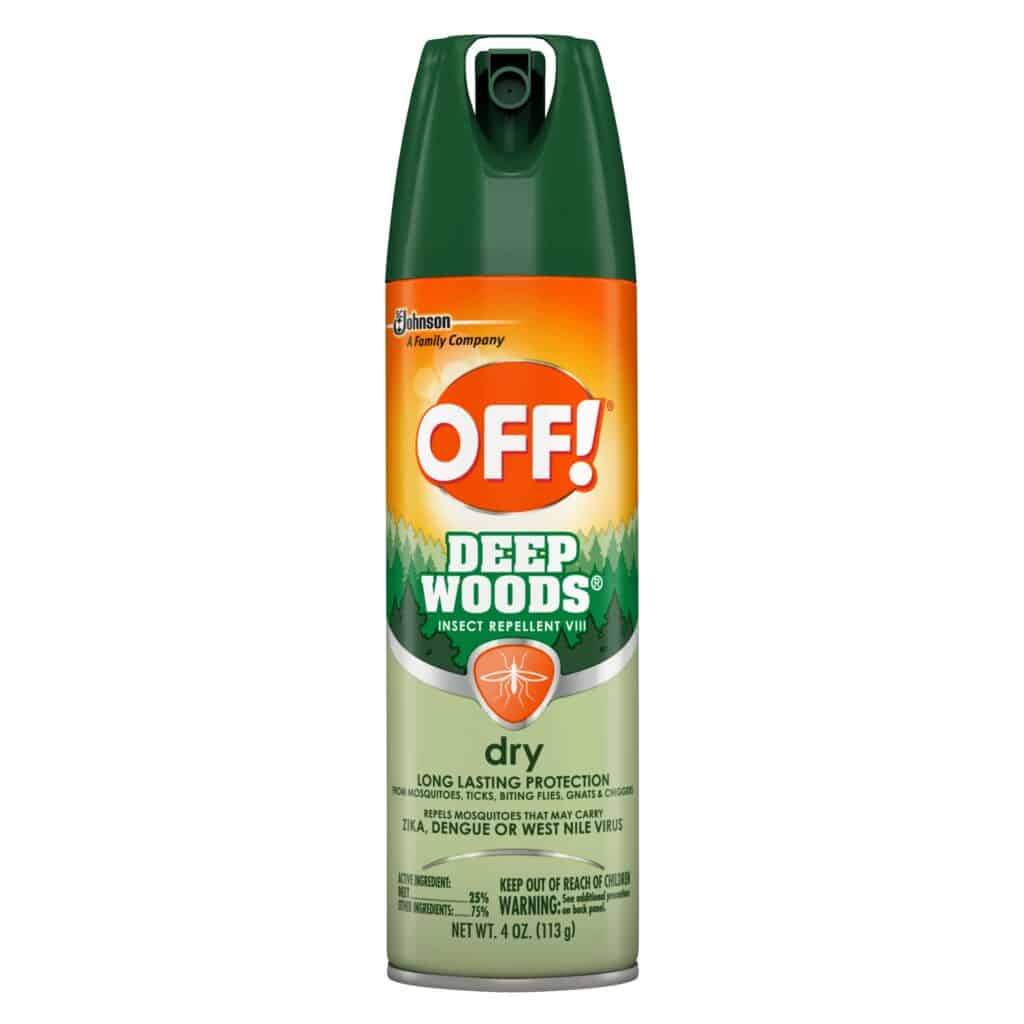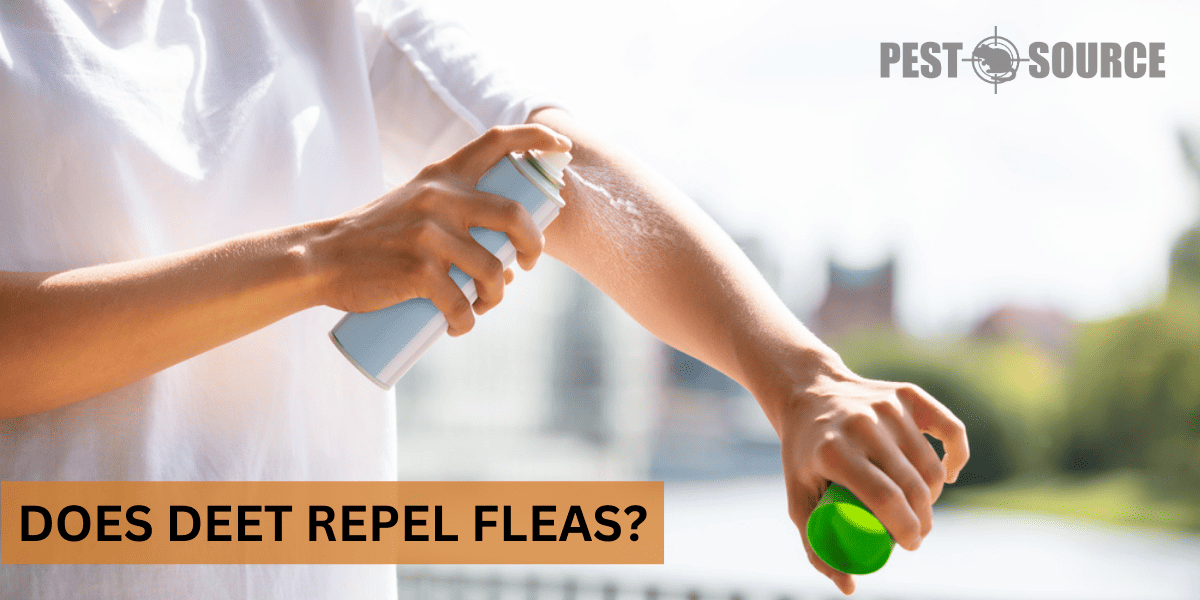When it comes to defending ourselves from pesky insects, DEET is a well-known ingredient in many insect repellents. It offers reliable protection against mosquitoes, ticks, and biting flies, but does DEET repel fleas as well?
This article delves into the effectiveness of DEET and its function in repelling fleas, compares it to other repellents like “Off,” and examines its impact on other common pests, such as lice and bed bugs. Additionally, we will discuss the limitations of DEET and provide alternative options to ensure comprehensive protection from various pests.
POINTS
- DEET is a widely used insect repellent, primarily effective against mosquitoes, ticks, and biting flies, but its efficacy against fleas, lice, and bed bugs is not well-established.
- DEET-based products might provide some level of protection against fleas, but they are not specifically designed or proven to repel or kill fleas, and more targeted treatments are recommended for better results.
- “Off” products containing DEET work similarly to other DEET-based insect repellents, so their efficacy against fleas is likely dependent on the DEET’s limited effectiveness.
- Comprehensive protection from pests requires employing targeted control methods, such as topical treatments for fleas, medicated shampoos for lice, and heat treatments for bed bugs, alongside the use of DEET-based repellents.
- Users should be aware of DEET’s limitations and not rely solely on DEET-based products for overall pest control. Combining DEET-based repellents with other pest control methods will provide the most effective protection.
What is DEET and how does it function as an insect repellent?
What is DEET?

DEET (N,N-diethyl-meta-toluamide) is a chemical compound that has been widely used as an insect repellent since it was first developed in the 1940s. It is a yellowish liquid with a faint odor and is primarily applied to skin or clothing to provide a protective barrier against biting insects.
How has DEET been traditionally used in insect repellents?

DEET has been a key ingredient in insect repellents for over six decades. It is found in various forms, such as aerosol sprays, lotion, and creams, and is available in multiple concentrations, ranging from 4% to 100%. The concentration of DEET in a product determines its level of effectiveness and the duration of protection it provides. The higher the concentration, the longer and more effective the protection against insects.
What are the primary insects that DEET is known to repel?
DEET is known to be effective against a wide range of insects, such as:
| Insect Type | Effectiveness |
|---|---|
| Mosquitoes | High |
| Ticks | High |
| Chiggers | Moderate to High |
| Biting Flies | High |
Its primary function is to disrupt the insect’s sense of smell, making it difficult for them to detect human skin and locate a potential host. By inhibiting the insect’s ability to find a target, DEET reduces the likelihood of insect bites and the transmission of insect-borne diseases like malaria, dengue fever, and Lyme disease.
Does DEET repel fleas specifically, and how effective is it?
While DEET’s effectiveness is well-documented for many types of insects, its efficacy against fleas is less clear and has been the subject of various studies and user experiences. The following table summarizes key aspects of DEET’s impact on fleas, offering a concise look at its repellent action, insecticidal effect, scientific evidence, and anecdotal user experiences.

| Aspect | Details |
|---|---|
| Repellency | Limited; varies by concentration and application method |
| Insecticidal Effect | Minimal; not designed as a primary flea control method |
| Scientific Evidence | Sparse; some studies suggest a weak repellent effect |
| User Experiences | Mixed; effectiveness varies among individuals |
Does DEET repel fleas?
While DEET is effective against many types of insects, its efficacy against fleas is not as well-established. Fleas are known to be more resistant to DEET than other insect species, and it is not typically considered to be the most effective solution for repelling fleas.
Does DEET kill fleas?
DEET may have a small effect on killing fleas, but it is not designed or marketed primarily as an insecticide. Its main function is to repel insects, including fleas, and prevent them from biting. It is important to note that DEET is not guaranteed to eliminate fleas entirely, as fleas can still bite humans and animals on areas where DEET has not been applied.
Is DEET effective as a flea repellent?
DEET might offer some protection from fleas, but the strength of its repellent action against these particular pests varies and is not well-documented. There are more specific and effective flea repellents on the market that target these insects specifically, as opposed to relying on a broader-spectrum product like DEET.
What scientific evidence exists about DEET’s effectiveness against fleas?
There is limited scientific evidence regarding the effectiveness of DEET against fleas. Some studies suggest that DEET can have a weak repellent effect on fleas, but the extent of its effectiveness varies depending on factors like the flea species, concentration of DEET, and application method. Overall, the evidence is sparse and inconclusive, which emphasizes the need for alternative treatments to manage flea infestations.
Do user experiences and testimonials support the efficacy of DEET against fleas?
User experiences and testimonials are varied when it comes to the effectiveness of DEET as a flea repellent. Some people may report positive results, while others might find little to no relief from flea bites. This discrepancy in experiences could be attributed to factors such as the severity of the infestation, the presence of other insect species, and individual differences in the way that humans and fleas react to DEET.
Does DEET kill fleas, or merely repel them?

Is there a difference between repelling and killing fleas in terms of DEET’s effectiveness?
Yes, there is a difference between repelling and killing fleas when it comes to DEET’s effectiveness.
| Action | Effectiveness | Notes |
|---|---|---|
| Repelling | Limited; varies based on factors like concentration and application | DEET primarily disrupts fleas’ ability to detect hosts but is less effective than against other pests. |
| Killing | Minimal; not a primary function of DEET | DEET has a modest insecticidal effect on fleas, but its primary purpose is repellence, not extermination. |
It’s important to note that DEET is primarily designed to repel insects, not to kill them. Its main action is to disrupt the sense of smell in insects like mosquitoes and ticks, making it more difficult for them to locate a host.
As for killing fleas, DEET might have a small insecticidal effect, but this is not its primary function and should not be relied upon as a primary flea control method. For more effective flea control, alternative treatments like insect growth regulators, spot-on treatments, and oral medications should be considered.
What is known about DEET’s ability to kill fleas?
There is limited evidence suggesting that DEET has any significant effect on killing fleas. Some studies have shown moderate insecticidal properties against fleas, but these findings are not consistent enough or backed by extensive research. DEET is primarily a repellent, and its ability to kill fleas is not well-documented or guaranteed.
Comparing DEET to other repellents: does “Off” work for fleas?

What is “Off” and how does it compare to DEET in terms of repelling and killing fleas?
“Off” is a popular brand of insect repellent products that contain various active ingredients, including DEET. “Off” products are designed to protect against mosquitoes, ticks, and other biting insects. However, their effectiveness in repelling or killing fleas is not well-established.
Since “Off” products containing DEET work in the same way as other DEET-based repellents, their efficacy against fleas is likely similar to other products containing DEET. That means they may offer some protection from fleas but are not specifically designed or proven to target fleas.
Does ‘Off’ work for fleas, repel fleas, or kill them?
“Off” products containing DEET might provide some level of flea repellency, but as previously mentioned, DEET is not primarily designed or proven to effectively repel or kill fleas. It is essential to manage your expectations when using any DEET-based insect repellent for flea control and consider alternative treatments specifically designed for fleas for better results.
How does “Off Deep Woods” specifically perform against fleas?

“Off Deep Woods” is a product line within the “Off” brand that contains higher concentrations of DEET, making it more effective against insects like mosquitoes and ticks. However, as with other DEET-based repellents, there is limited evidence supporting its efficacy against fleas. While it may offer some protection, it is not specifically designed to repel or kill fleas.
Understanding the effectiveness of general bug sprays on fleas

How effective are bug sprays that are not specifically designed for fleas?
Bug sprays that are not specifically designed for fleas, such as those containing DEET or other broad-spectrum repellents, might provide some degree of protection against these pests. However, their effectiveness is not as reliable as products that are explicitly formulated to target fleas. General bug sprays might work for some individuals, but for ongoing, severe flea infestations, more targeted flea control methods should be explored.
Are there differences in the abilities of various bug sprays to repel or kill fleas?
Yes, there can be differences in the effectiveness of various bug sprays when it comes to repelling or killing fleas. Some bug sprays might have active ingredients that are more effective against fleas than others, while some might not have any noticeable effect at all. It is essential to research and select a product specifically designed to target fleas for the best results, rather than relying on general bug sprays.
Can mosquito repellents effectively deal with flea infestations?

Is there a significant overlap in the repellents used for mosquitoes and fleas?
While there might be some overlap in the chemicals used in mosquito and flea repellents, the effectiveness of these chemicals may vary significantly between the two types of pests. Some mosquito repellents, like DEET, could provide limited protection against fleas. However, the efficacy of mosquito repellents against flea infestations is not well-established.
How does the use of mosquito repellent impact flea populations?
The impact of using mosquito repellent on flea populations is not well-studied or understood. While mosquito repellents like DEET might provide some level of protection against fleas, it is unlikely that they will have a significant impact on the overall flea population in a given area. For more effective flea control, targeted methods that are specifically designed to deal with fleas should be explored.
Do DEET and other insect repellents work on other common pests, like lice and bed bugs?
The efficacy of DEET and similar insect repellents extends beyond just mosquitoes and ticks, but how well do they perform against other common nuisances like lice and bed bugs? The table below explores DEET’s impact on these pests, providing a clearer understanding of its limitations and effectiveness.
| Pest | Repel | Kill | Notes |
|---|---|---|---|
| Lice | Limited | Minimal | Some protection, but targeted treatments preferred |
| Bed Bugs | Not Effective | Not Effective | DEET offers little to no protection against bed bugs |
This comparison reveals that while DEET is a versatile repellent, its effectiveness is not uniform across all types of pests, highlighting the importance of employing pest-specific control methods for optimal protection.
Is there evidence that DEET can repel or kill lice?

There is limited evidence to support the use of DEET for repelling or killing lice. Some studies have suggested that DEET might offer some protection against lice, but its effectiveness varies, and it should not be considered a primary treatment option for lice infestations. More effective, targeted treatments like medicated shampoos, creams, and oral medications should be used for dealing with lice.
How effective is DEET against bed bugs?

DEET is not considered effective against bed bugs. These pests are notoriously resilient and difficult to eliminate. Using DEET as a bed bug repellent might be of little to no benefit in controlling their infestations. Instead, professional extermination, heat treatments, and encasements for mattresses and box springs should be employed to combat bed bug infestations.
Are there differences in the abilities of DEET and “Off” products to repel or kill lice and bed bugs?
Given that “Off” products may also contain DEET as the active ingredient, their effectiveness against lice and bed bugs is likely similar to other DEET-based repellents. This means they may have limited, if any, effectiveness in repelling or killing lice and bed bugs. Targeted treatments specifically designed for these pests should be employed for effective infestation control.
Conclusion: Evaluating the overall efficacy and versatility of DEET-based repellents
Given the evidence, how effective is DEET overall as a repellent for various pests?
DEET remains an effective repellent against several pests, particularly mosquitoes, ticks, and biting flies. Its ability to repel and protect against potentially disease-carrying insects makes it a valuable tool in many situations. However, the effectiveness of DEET against fleas, lice, and bed bugs is not well-established, and it should not be relied on as the primary control method for these pests.
What limitations should users be aware of when relying on DEET-based products for pest control?
When considering DEET-based products for pest control, it’s important to recognize their limitations:
- Not effective against all pests: While excellent against mosquitoes, ticks, and biting flies, DEET’s protection doesn’t extend as effectively to fleas, lice, and bed bugs.
- Alternative methods required: For pests like fleas, lice, and bed bugs, it’s crucial to use targeted control strategies, as DEET alone won’t ensure complete protection.
- Comprehensive approach needed: Relying solely on DEET-based products is not sufficient for all-round pest control. A combination of methods tailored to specific pests is often the most effective strategy.
What other options might be recommended for those seeking comprehensive protection from pests?
For comprehensive protection from pests, it is essential to combine DEET-based repellents with other pest control methods. Depending on the targeted pests, these may include:
- Fleas: Topical treatments, flea collars, oral medications, and environmental control (flea sprays and vacuuming)
- Lice: Medicated shampoos, creams, and fine-toothed flea combs for removing lice and nits
- Bed bugs: Heat treatments, mattress and box spring encasements, and professional extermination
Ensuring that you use the appropriate methods tailored to the specific pests you are dealing with will provide the most effective and comprehensive protection.



